“Terrorism” “They are terrorists” “Allah akbar” “The Taliban”
These are some of the responses I have been getting every day as I have been public speaking at my local high school. My high school. Where things change slowly and ideas even slower. I have spoken at the high school or community group probably 15 of the 20 days I have been home. In speaking with the high schoolers, I always lead in with the question, “what do we know about Muslims?” knowing full well the immediate, unflinching response. Do they realize that they are labeling my host mother, Kadja, as a murderer? That they are therefore unquestionably sure that my host brothers, who love to play soccer and currently are studying Physics and English at the university in Dakar, are going to pick up machine guns and attack innocent people? No, they don’t realize this. They do not mean to offend my host family and friends who I have grown to love and admire. They don’t know little Kadja or Mamoudou or Amadou Diallo.
(Disclaimer – these only represent MY experience living in THIS SPECIFIC Muslim society in the Fouta region of Senegal and does not represent EVERY Islamic part of the world. I merely hope to give an example of an Islamic society that will never make the news due to its’ lack of newsworthy ‘excitement’. I simply hope to demonstrate an alternate truth to the same reality)
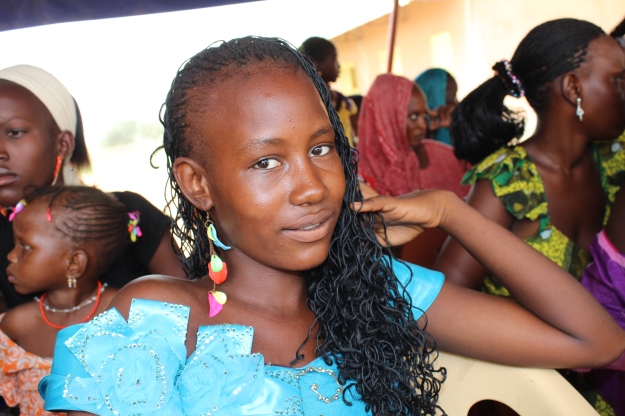
There are no Muslims here in this community, from what I can tell. My own family has lived here now for 16 years and, for most of those years I would not have even known what the difference would have been. How would any of these high school kids ever have had the experience of knowing anyone who was Muslim in order to know whether or not their prejudice is correct? All they see on television is extremism, violence, warfare, and yelling politicians – riling us all up, scaring us, urging us to keep the terrorism away from our front door. It’s no wonder they are scared. Certain news channels, if watched consistently, can be very successful at building up ideas in the shape of truths in the minds of many Americans who may not have the financial means or prioritization to see and experience things outside of their comfort zones and understandings. We cannot blame the effects of fearmongering on those whom it effects. They are the result that does, however, perpetuate the act.
I have presented my experiences in Senegal to many different high school groups: Advanced placement students, drama class, culinary class, ROP childcare, AVID, computer/technology, English, US History, Spanish, and students chosen for the exchange program to Italy (to name a few). Each of these classes represents a unique group of students from both extremes of privileged to the very disadvantaged. The conversations were positive and eye-opening experiences for everyone involved – mostly me. They brought me back to reality and allowed me to, once again, see my experience through the eyes of an American citizen.
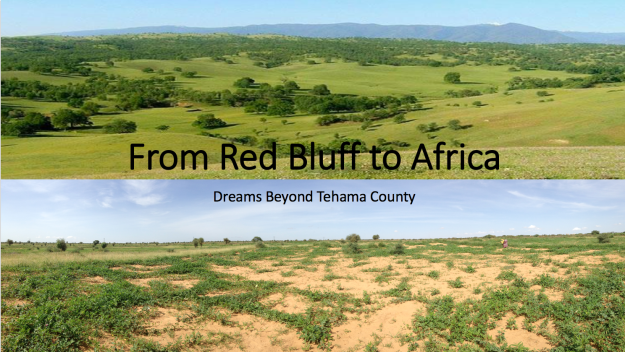
My presentation changed depending on the audience and class curriculum to keep it relevant and relatable, but some key components stay consistent. Through these presentations, it has become evident to me which aspects of my experience are the most important to discuss.
Consistent Topics:
- Stay involved in high school, go to college or find a way to contribute positively to society
- What is Peace Corps and what are the basic aims of international development?
- Development in Senegal and throughout Africa – shocking as it is to many, I had electricity, clean running water, and phone/internet service in my village. Not all of Africa lives in thatched huts.
- Africa is a diverse continent made up of 54 different unique countries
- Food! Everyone wants to know what the daily meals consist of if McDonalds is not the norm
- The toilet situation and lack of toilet paper
- Senegal is a Muslim country (95.4% according to Wikipedia). This is the topic I probably spend the most time on because it is both relevant and necessary when discussing anything about my experience in Senegal.
Back to the classroom…
“Ok, terrorism…? That’s what certain news tells us about Islam? That they’re all terrorists?” I lead… “Yea!” says the overly boisterous one in every class, always eager for sniggers from his buddies sitting around him.
As a product of this area and predominant way of thinking, I had similar concerns about non-Christian faiths, because I had only known one lifestyle. You can probably guess my hesitations and my parents’ extreme anxieties about me, a very obviously white female, going to live in a predominantly Muslim country for two years of my life. However, after living there and experiencing what was the most amazing, wonderful, and life-changing two years of my life, I cannot even fathom how wrong the current perpetuating stereotypes are that cover this huge religion in blanket statements and assumptions.
Granted, terrorism is real and affecting the world, but the people who are perpetrating these disgusting acts are the only ones from this entire global population who are ‘exciting’ enough to make the news.
Turns out this kind of news-worthy excitement is not necessarily a good thing.
Case in point: Senegal. When I found out my Peace Corps placement was Senegal, I was immediately a little let down because it is not a widely known country to us here in America. I had to google it, myself. I would have been much more excited to have been assigned to go somewhere more flashy, like Kenya or South Africa. These countries are places I have heard a lot about. They make the news. I see them on TV and in movies. These places are exciting. In retrospect, however, I cannot be thankful enough for ending up in a place that allowed me to learn about another culture, another religion, another worldview, in the safety and security of a politically and violently unexciting country. Excitement came in more fulfilling ways. I was not caught in the middle of any political strife or evacuated due to military coups. Instead I was excited by breakthroughs in language and cultural understandings. I was excited through my ability to learn about my own religion in the context of another. To have open, honest, and respectful conversations about differences of understandings and beliefs. I was excited to be seen as a person and not as my viewpoints, be it religious or political. I was never labeled as ‘the Christian’ as we would label someone in our society, “the Muslim who works with me” “the Muslim guy in the office,” etc.… I was just Coumba (sometimes white person Coumba), but never “Coumba who does not agree with polygamy,” or “Coumba who eats pork and drinks alcohol.” Just Coumba Demba Thiam. Daughter of Kadja, who lives in the house of Hamath Thiam.
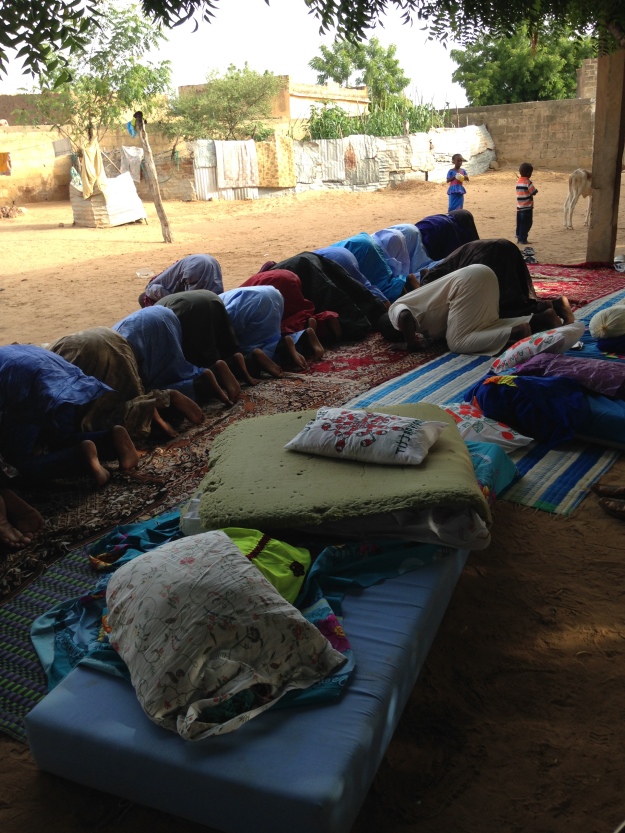
As a female in a Muslim society, I covered my head. This had multiple benefits: showing respect to the religion, marking me as a woman as opposed to a child, it kept the sun and heat off my head, and also allowed me to get away with not washing or needing to style my hair much. Really, so many benefits, and few, if any downsides.
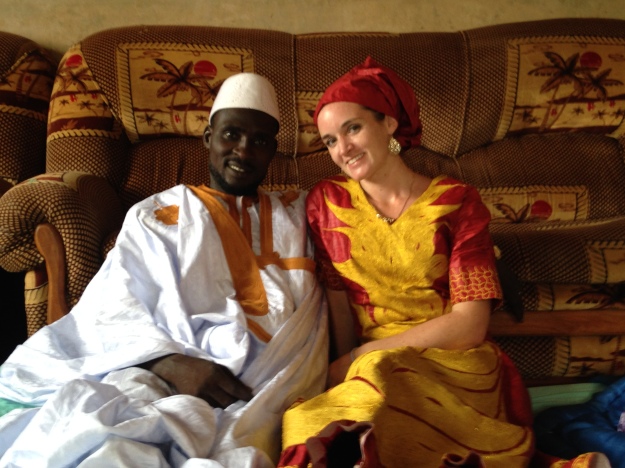
As a female in a Muslim society, I never felt threatened walking alone. I just never did. My skin attracted enough attention, but the attention was never violent in any way. I could walk at night, even in urban areas, and never feel in danger. Maybe I was lucky, but I never had any instances of aggression towards me the entire time I was there. This is much more than I can say walking around the streets in America. Even in the quaint, sleepy town of Red Bluff, I would never dare to be out alone on the streets at night.
Living in a Muslim society, I never felt as if my possessions were in danger. I only locked my door if I was going out of town overnight or for multiple days. During the day, I could be in some town miles away, but I never locked my door. It was common knowledge that I owned a computer, camera, clothes, a bike, and probably much more money than most people, and yet I never thought twice walking away from my room – the screen door barely latched, the purple curtain ruffling in the breeze. Even after locking the metal door to leave for a few days, I always left my key with my host mother Maymouna who would keep it in a secret, safe place (even I don’t actually know where she kept it). If there was an emergency, she would be able to access my room. That was more important.
Living in a Muslim society, violence was extremely low. I did not actually see any violence the entire time I was there except for the occasional quarrelling among transportation ‘aprantees’. Murder is strictly forbidden in the Qur’an. Qur’an 6:151 says, “and do not kill a soul that God has made sacrosanct, save lawfully.” (i.e. murder is forbidden but the death penalty imposed by the state for a crime is permitted). 5:53 says, “… whoso kills a soul, unless it be for murder or for wreaking corruption in the land, it shall be as if he had killed all mankind; and he who saves a life, it shall be as if he had given life to all mankind.”
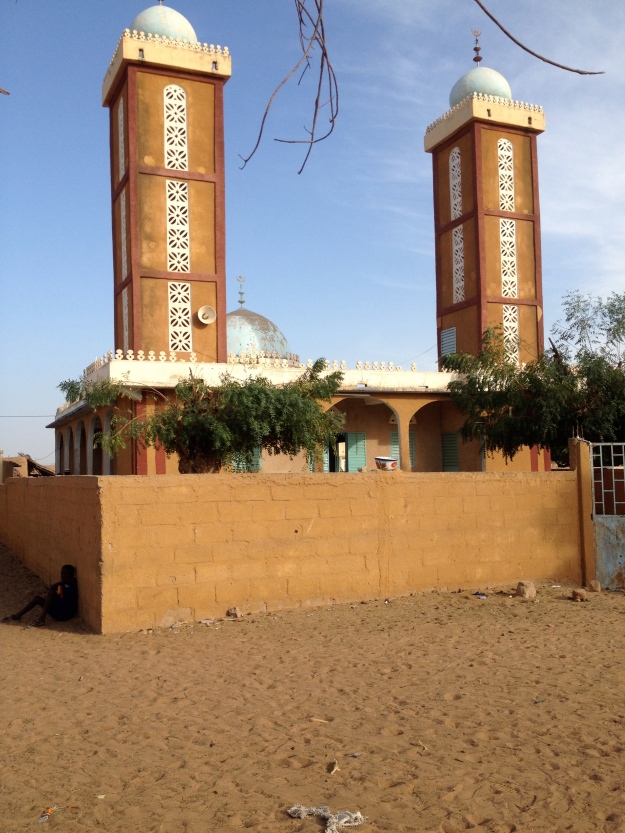
The mosque of Mbolo Aly Sidy! Centered in the middle of the village, can be seen from the villages on either side.
What do we know about Islam in a place like Red Bluff, California? Not much, if anything more than what is shown on TV. The point I am trying to convey is that there is another side to every story. Question what you see on the news. Make your own informed opinions.
(Side note: after writing this, I was speaking in an alternative education high school and got an answer unlike any I had received previously. I asked, “what do we see on TV about Muslims?” The student who spoke up in the second row said, “Propaganda.” Then ensued the most honest and boundary-pushing conversation of them all. I was proud of them for the questions they asked and their general sincerity and respect. I walked away with a new respect for a group of kids who would otherwise be labeled as ‘troubled’. I call them: astonishing.)

